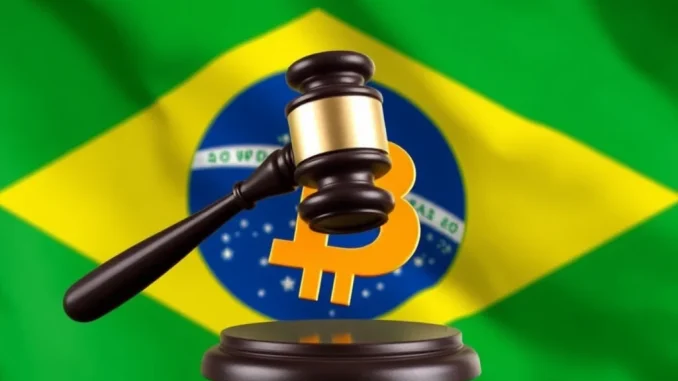
Hold on to your hats, crypto enthusiasts! The winds of regulation are blowing strong, this time from the land of samba and sunshine – Brazil. In a move that’s sending ripples through the financial world, Brazil’s National Monetary Council has dropped a bombshell, effectively barring closed pension funds from dipping their toes into the volatile waters of cryptocurrency investments. Specifically, this Brazil crypto ban targets Bitcoin and other digital currencies, raising eyebrows and sparking debate about risk, regulation, and the future of institutional crypto adoption.
Why the Sudden Brazil Crypto Ban for Pension Funds?
The official reason, straight from the Resolution 5.202/2025 issued by the National Monetary Council, boils down to good old-fashioned risk aversion. Closed pension funds (EFPCs), which manage retirement savings for a significant chunk of Brazil’s workforce, are being shielded from the perceived dangers of the notoriously unpredictable crypto market. Think of it as a paternalistic approach – the government stepping in to protect potentially vulnerable retirement nest eggs from the wild swings of Bitcoin and its digital brethren.
Let’s break down the key points of this crypto pension funds restriction:
- Targeted at Closed Pension Funds (EFPCs): This ruling is laser-focused on EFPCs. It’s crucial to understand that this doesn’t paint a blanket ban across the entire Brazilian financial landscape. Open pension funds and individual retirement savings products are currently outside the scope of this regulation.
- Risk Concerns at the Forefront: The core justification is risk management. Cryptocurrencies, with their inherent volatility and nascent regulatory frameworks, are deemed too risky for the conservative portfolios of closed pension funds.
- Resolution 5.202/2025: This is the official document codifying the ban. If you’re digging for specifics, this is the reference point.
- Not a Blanket Crypto Prohibition: It’s important to reiterate – Brazil isn’t suddenly anti-crypto. This is a targeted measure for a specific type of financial institution, reflecting a cautious approach rather than outright rejection of digital assets.
Decoding the Bitcoin Investment Ban: What Does This Really Mean?
This Bitcoin investment ban for pension funds isn’t just a bureaucratic footnote; it carries significant implications. Let’s unpack what this means for different stakeholders:
For Pension Fund Members:
- Potentially Lower Returns, Potentially Lower Risk: On one hand, pension fund members are shielded from the potential downside of crypto crashes. On the other hand, they also miss out on the potential for high returns that crypto investments *could* offer. It’s a trade-off between security and potential growth.
- Conservative Investment Strategy Reinforced: This move reinforces the traditionally conservative nature of pension fund investments. Expect continued focus on lower-risk asset classes.
For the Brazilian Crypto Market:
- Reduced Institutional Investment Flow: Closed pension funds represent a substantial pool of capital. Excluding them from the crypto market could dampen institutional investment inflows into Brazilian crypto exchanges and projects.
- Increased Scrutiny on Crypto Regulation: This ban underscores the ongoing regulatory uncertainty surrounding cryptocurrencies globally. It might prompt further debate and development of clearer regulatory frameworks for digital assets in Brazil.
- Focus Shifts to Retail and Open Funds: With EFPCs sidelined, the focus for crypto adoption in Brazil might further shift towards retail investors and potentially open pension funds (if regulations remain unchanged for them).
For Global Crypto Markets:
- Precedent Setting? While Brazil is not the first to regulate crypto, this move by a major emerging economy could set a precedent for other nations grappling with how to handle institutional crypto investments, particularly within retirement savings.
- Reinforces Risk Narrative: This decision reinforces the narrative that cryptocurrencies are still considered high-risk assets by many regulatory bodies, especially when it comes to safeguarding public funds like pensions.
Brazil Crypto Regulation: A Sign of Things to Come?
The Brazil crypto regulation landscape is still evolving. While this ban might seem like a setback for crypto advocates, it’s essential to view it within the broader context of global regulatory trends. Governments worldwide are wrestling with how to balance innovation and investor protection in the burgeoning crypto space.
Here are some key questions and points to consider regarding the future of crypto regulation in Brazil:
- Will this ban extend to open pension funds? The current ruling is limited to EFPCs. The question is whether regulators will eventually broaden the scope to include open pension funds or other types of institutional investors.
- What about ETFs and other crypto investment vehicles? The resolution specifically mentions Bitcoin and cryptocurrencies. It remains to be seen how it will impact other crypto-related investment products like ETFs, should they become available in Brazil.
- Is this a temporary or long-term measure? Regulatory landscapes are dynamic. This ban could be revisited and potentially revised in the future as the crypto market matures and regulatory frameworks become clearer.
- Will Brazil develop a more comprehensive crypto regulatory framework? This ban might be a precursor to a more comprehensive regulatory framework for digital assets in Brazil, aiming to provide clarity and structure to the market while mitigating risks.
Navigating the Crypto Investment Landscape: Actionable Insights
For crypto investors and enthusiasts, particularly in Brazil, this news warrants a recalibration of expectations and strategies. Here are some actionable insights:
- Stay Informed on Regulatory Developments: The crypto regulatory landscape is constantly shifting. Keep a close watch on announcements and policy changes from Brazilian authorities.
- Diversify Your Crypto Investment Strategy: Don’t rely solely on institutional investment flows. Focus on building a diversified portfolio that includes retail participation and explores opportunities in other sectors of the crypto ecosystem, such as DeFi and NFTs.
- Advocate for Clear and Balanced Regulation: Engage in constructive dialogue with policymakers and industry bodies to advocate for regulatory frameworks that foster innovation while addressing legitimate risk concerns.
- Explore Alternative Investment Avenues: For those seeking crypto exposure within retirement planning, explore individual retirement products or open pension funds (if permitted) that might offer indirect or limited exposure to digital assets, while remaining compliant with regulations.
Conclusion: A Calculated Caution or a Missed Opportunity?
Brazil’s decision to block pension funds cryptocurrency investments is undoubtedly a significant development in the ongoing saga of crypto regulation. Whether it’s a prudent move to protect retirees or a missed opportunity to tap into a potentially high-growth asset class remains a subject of debate. What’s clear is that this decision underscores the cautious approach many regulators are taking towards crypto, particularly when it involves safeguarding public funds. As the crypto market continues to evolve, expect more regulatory twists and turns globally. Staying informed, adaptable, and engaged will be crucial for navigating this dynamic and often unpredictable landscape.



